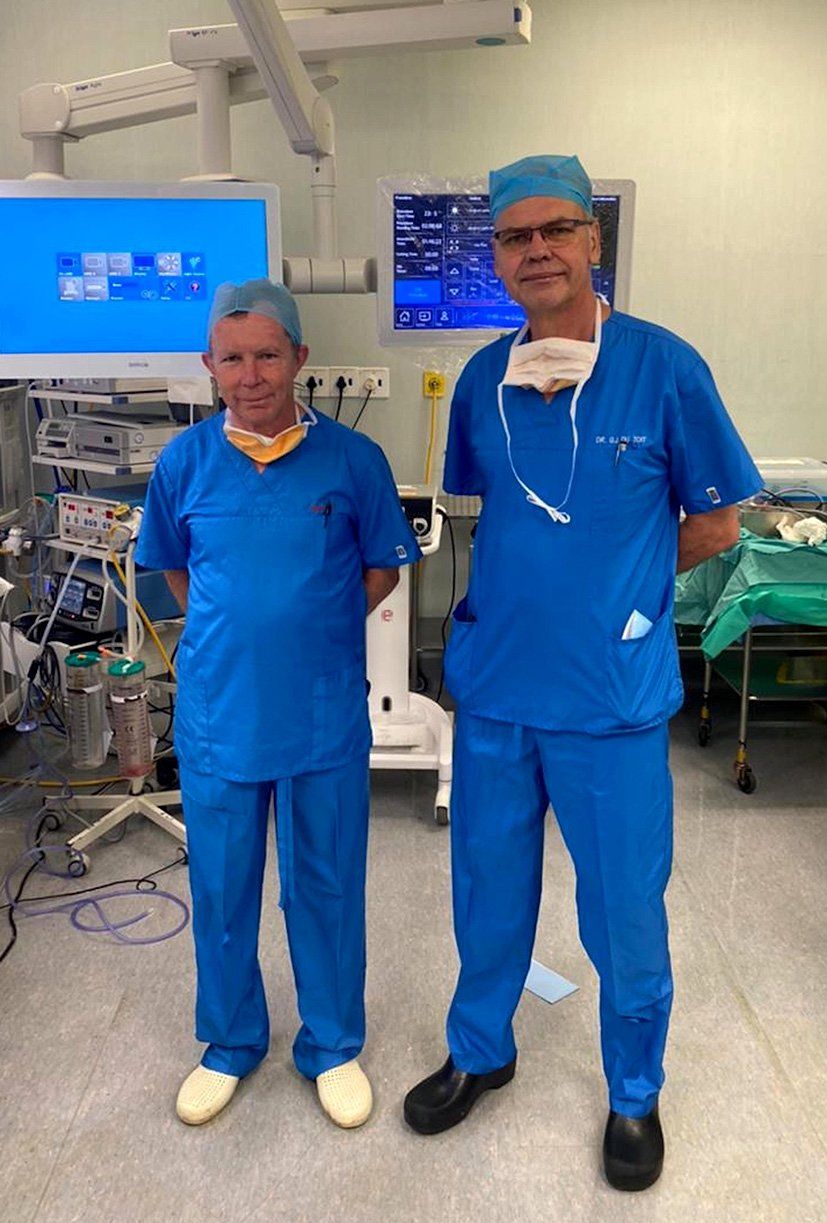Durban metabolic surgery centre joins ranks of the few in SA accredited to perform specialised procedure
Morbidly obese patients can now receive help close to home in KZN
The Durban Metabolic Surgery Centre, run by well-known surgeons Dr Gert du Toit and Dr Ivor Funnell, has been accredited by the South African Society for Surgery, Obesity and Metabolism (SASSO) to perform the highly advanced Biliopancreatic Diversion with Duodenal Switch (BPD-DS) surgery.
Performing procedures at Netcare St Augustine’s and Netcare uMhlanga hospitals, Drs Du Toit and Funnell started performing laparoscopic gastric bypass surgery – the preferred procedure for morbid obesity and associated illnesses including type 2 diabetes – in 2006. Since then the team has completed approximately 660 procedures, which have achieved some life-changing results for patients.
Why BPD-DS surgery?
“The gastric bypass procedure has been the gold standard for weight loss, or metabolic surgery, for around 30 years. However, ongoing research and audits have demonstrated that super obese patients, especially those with BMIs of around 55 to 60 and higher and with long term diabetes, do better with more drastic malabsorptive procedures such as BPD-DS surgery,” comments Dr Du Toit.
“With patients requiring comprehensive post-operative management from a multi-disciplinary team, as well as support from family and loved ones, this was not always an easy option for those in KwaZulu-Natal to have BPD-DS surgery as it was not offered locally. We are delighted that we are now able to perform this much needed, tailormade procedure here in KwaZulu-Natal at Netcare St Augustine’s Hospital,” he says.
BPD-DS surgery explained
Dr Du Toit explains that BPD-DS surgery offers a very specific set of benefits but takes quite a bit longer to perform when compared to a gastric bypass. “In the hands of practised surgeons a gastric bypass can take approximately one hour 30 minutes, whereas the BPD-DS procedure is about four hours long. In addition, more comprehensive, multi-disciplinary post-operative care as well as ongoing monitoring of vitamin levels and supportive infusions are required.
According to the International Society for Weight Loss Surgery (IFSO), the most authoritative society in the field of metabolic surgery internationally, less than one percent of all bariatric procedures undertaken throughout the world are performed as a BPD-DS because of its complexity.
“The BPD-DS procedure is not suitable for everyone. Patients who stand to benefit most from it are morbidly obese individuals with comorbidities and longstanding diabetes. The uncommon, complex procedure involves the surgical removal of about 60 to 70 percent of the stomach, leaving the patient with a smaller, tube-shaped stomach. Thereafter, the end portion of the small intestine is divided much lower down than in the case of a gastric bypass. In this way, two thirds or more of the intestine is bypassed so that the end portion of the intestine can be connected to the duodenum near the stomach. The BPD-DS controls how much can be eaten and lowers the absorption of proteins, fats as well as nutrients,” notes Dr Du Toit.
The Durban Metabolic Surgery Centre, based at Netcare St Augustine’s and Netcare uMhlanga hospitals, has recently joined the ranks of few specialised centres in South Africa, when it was accredited by the South African Society for Surgery, Obesity and Metabolism (SASSO) to perform the highly advanced Biliopancreatic Diversion with Duodenal Switch surgery. The centre is run by Dr Ivor Funnel (left) and Dr Gert du Toit (right) who started performing laparoscopic gastric bypass surgery as the preferred procedure for morbid obesity and associated illnesses, including type 2 diabetes, in 2006. Since then the team has performed approximately 660 procedures, which have achieved some life-changing results for patients.
Stringent requirements
SASSO, which is affiliated with IFSO, requires surgeons to perform around 300 gastric bypass operations and only thereafter do they become eligible to be proctored and accredited to perform the BPD-DS procedure. This requires that the surgeon attend at least two cases performed by the proctoring surgeon. Thereafter the proctor has to be in attendance at the candidate surgeon’s facility while the surgeon performs three cases on their own.
According to Dr Du Toit, he and his colleague Dr Funnell were privileged to have the highly skilled and experienced Dr Gary Fetter, who has the unique accomplishment of having performed around 1 200 of these procedures at Netcare Waterfall City Hospital, proctoring the team at Netcare St Augustine’s Hospital.
“I was assisted by Dr Funnell and Dr Bruce Yelland and we successfully performed five BPD-DS procedures over a period of two days. These were all interesting yet complex procedures with the potential to change the lives of a number of relatively young patients. To date the results which were tracked over a period of three months have been heartening, with the patients losing an incredible 164 kilos between them by 10 January 2022. More importantly, each of the patients have had an uncomplicated recovery.
“The weight of the first 35-year-old female patient has to date dropped from 223kg to 182kg while a second 38- year-old-female, who initially weighed 131 kg, reflected a loss of some 20 kg. A 27-year-old female patient was able to start 2022 with a drop in weight from 175 kg to 118 kg while our two male patients aged 30 and 39 respectively were able to reduce their weight from 164 kg to 139 kg and from 254 kg to 233 kg over the past three months.
“We have subsequently done a number of these procedures and are delighted with the results obtained to date. Obtaining this level of accreditation required a tremendous team effort from a number of departments at Netcare St Augustine’s Hospital as well as by local pharmaceutical suppliers. This achievement and the work that got us to this point was truly a team effort by the administrative staff, specialists, other healthcare professionals, combined with the support of the hospital management, the world-class surgical facilities and equipment provided by Netcare, and the quality care provided by the hospital’s nursing staff. The accreditation is an acknowledgement of the contributions each has made towards providing our patients with hope for the future and a new lease on life,” Dr Du Toit asserts.
“It is extremely gratifying for us that the Durban Metabolic Surgery Centre has received this all-important accreditation from SASSO, a highly-esteemed national authority,” says Heinrich Venter, general manager of Netcare St Augustine’s Hospital
“The work that the multi-disciplinary team, led by Dr Du Toit, has done at the hospital has been nothing short of life-changing for so many individuals. This accreditation is testimony to the hard work and exceptional expertise of the team,” he adds.
“On behalf of Netcare St Augustine’s Hospital we congratulate Dr Du Toit, Dr Funnell and everyone who has contributed towards this important milestone, which firmly places Netcare St Augustine’s Hospital on the map for BPD-DS and other forms of metabolic surgery,” concluded Venter.














